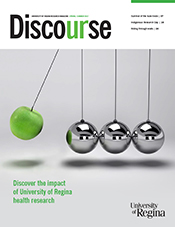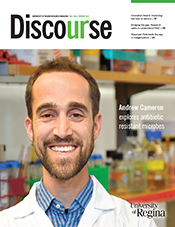Many older adults have reported that support from their family, friends, staff, and community is helping them cope with the pandemic.

Many of Canada’s older adults have been severely impacted by the COVID-19 global pandemic. Those who live alone or depend on others to meet their daily needs have encountered added challenges, such as having their services reduced, moved online, or even cancelled.
But how have their living arrangements contributed to or detracted from how they are coping?
Vivian Puplampu, assistant professor in the Faculty of Nursing, was awarded a $5,000 grant from the University of Regina’s Humanity Research Institute to explore the impact of older adult’s living arrangements on their well-being during the pandemic.
Puplampu conducted her research alongside an advisory group of older adults – Paul Benson, Lois Adams, and Vivienne Hauck. The advisory group was involved in all stages of the study.
Participants in the research included nineteen older adults, aged 65 years and older, living in private homes, cohousing, and assisted living communities in Saskatoon and Regina. From August to September 2020, the research team interviewed the participants using either phone or Zoom calls.

The research team created the following animated video to summarize the key research finding:
Key findings from the study revealed that the older adults in this study generally felt safe during the COVID -19 pandemic because of the precautions they had put in place, including isolating at home, screening and limiting the number of outsiders who entered their homes/buildings, washing their hands, wearing masks, not attending social gatherings, and keeping a small bubble of friends and immediate family members.
The participants reported that some of the challenges the pandemic caused them included their limited access to doctors and specialist services, as well as not being able to access help from industries such as carpentry. They also missed human contact, felt lonely, and experienced some levels of depression because of reduced visits, cancelled parties and programs, and an inability to travel.
Older adults from private homes reported more feelings of isolation and depression at the start of the social isolation measures than those in co-housing or assisted living communities. A female participant in her 70s from private home said, “I would say it’s [isolating] because we are in our own home and family doesn’t come the way they would otherwise. And nobody stays here…I would say we're fairly isolated.”
The support older adults provided to others, such as driving children, baby-sitting grandchildren, and calling to check in on others, brought them a sense of accomplishment.
Although the pandemic presented challenges to the older adults, the participants also reported some benefits, such as having better awareness of comorbidity and infection prevention measures, an opportunity to slow down, enjoyment of solitude, and getting to know neighbours and their neighbourhoods.
The participants also shared that support from their family, friends, staff, and community by bringing groceries, helping them get to appointments, as well as simply checking in on them, was important to helping them cope with the pandemic.
Other ways the participants reported coping with the pandemic included playing indoor games, watching TV, reading, maintaining contact with children and family through Zoom and phone calls, working in the yard and garden, going for walks, taking an online university class, and taking stock of what they were thankful for. The support older adults provided to others, such as driving children, baby-sitting grandchildren, and calling to check in on others, brought them a sense of accomplishment.
A highlight of the project was the older adults’ involvement in the advisory group and end of project seminar. Paul Benson said, “It makes you feel young again.” While Lois Adams said, “The introduction to animation video in a presentation, using new features on Zoom, listening to the student presentations, participating in the debut research presentation were bonus learning experiences.”

















